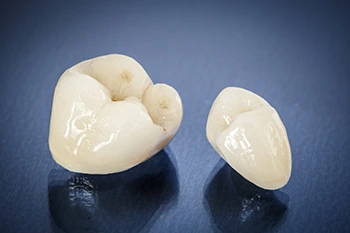Even when you are vigilant with your oral care routine, things can happen that damage your teeth. Restorative dentistry is an area of dentistry focused on restoring the function and appearance of teeth. The primary focus is the function of the tooth. There are several types of dental restorations, including dental fillings, dental veneers, dental crowns, and more.
In this article, we’ll explain more about dental crowns and what you can expect from a dental crown procedure at Clarksburg Dental Center in Germantown, MD.

Typically, dental crown placement requires two visits:
During the first visit, the dentist will prepare the tooth for a crown. This requires removing some of the enamel to create space for the crown and to make sure that it will stay on once it’s placed. Filling material may be used to build up parts of the tooth and create a stable foundation for the crown.
Once this is done, the dentist will take an impression of your teeth with dental putty or a digital scanner. These will be sent to the dental lab for the fabrication of your custom-made dental crown.
The final step in your first appointment will be to place the temporary crown. This will protect the tooth while you wait for the dental lab to fabricate your permanent one. Most of the time, this takes about 2 to 3 weeks. A temporary crown is typically stainless steel, resin, or acrylic.
When your permanent crown is ready, the lab will send it to the dental clinic and your second appointment will be scheduled. During this visit, the dentist will remove the temporary crown and clean the tooth. Then, the new crown will be checked to make sure that it fits properly. Finally, the permanent crown will be bonded to your tooth.
Some dental clinics offer same-day crowns. The procedure is basically the same, including preparing the tooth and placing the crown. The biggest difference is that no temporary crown is required. It is important to note that this procedure uses advanced technology and is more convenient, so it will be more expensive.
Dental crowns may be temporary or permanent. Temporary crowns are typically either pre-fabricated or made in the dentist’s office. A temporary crown is usually stainless steel or acrylic-based and is used to temporarily protect the tooth while waiting for the permanent one. A permanent crown, on the other hand, is usually fabricated in a dental lab and may be made of metal, porcelain, porcelain-fused-to-metal, or resin.
Metal crowns are made from alloys with a high platinum or gold content. These crowns are designed to withstand biting/chewing forces and last the longest. These crowns rarely chip/break, making this material ideal for molars. The primary disadvantage of this type of crown is the cost.
Porcelain or ceramic crowns are ideal for patients who are allergic to metal. This material offers a better color match to surrounding teeth than other options. Due to their strength and appearance, this type of crown can be used on front or back teeth.
Porcelain-fused-to-metal crowns offer the strength of metal and the color match of porcelain. However, more wear and tear happens to these from the opposing teeth and the porcelain may chip/break. One of the major disadvantages is that the metal may show through as a dark line, especially at the gum line. This is even more pronounced if your gums are receding. This type of crown is ideal for front or back teeth.
Resin dental crowns are the least expensive. However, it is important to note that they do wear out quicker and are more likely to fracture than other options.
Dental crowns range between $900 to $3,500+, depending on several factors:
Most dental insurance providers do cover a portion of dental crowns. Our office staff will work with your provider to determine coverage. If you need help paying for your treatment, we also offer financing options.
Dental crowns are a dental restoration used to:
After you get a dental crown, your smile will be fully restored in both functionality and appearance.
Most patients are able to return to their normal routine almost immediately. However, you may have some sensitivity and soreness/tenderness for a few days to a few weeks. You can take an OTC pain reliever to address the soreness.
While a crown will restore your ability to chew many things, there are several things that you should avoid, including:
These can damage your crown or cause it to come off.
Dental crowns and dental veneers both alter the appearance of your teeth. However, crowns are considered restorative because the primary purpose is to restore the function of teeth and veneers restore the appearance. There are a few other things you might want to know about these two dental procedures:
| Dental Crowns | Dental Veneers | |
| Type of procedure | Restorative | Cosmetic |
| Average Cost | Ranges from around $900 to $3,500 depending on several factors including the location of the tooth and the material chosen |
|
| Does insurance cover treatment? | Typically, dental insurance will cover a portion of dental crowns | Most providers will not cover veneers because this is classified as a cosmetic procedure |
| Which teeth can be treated? | Dental crowns can be placed on both front and back teeth | Dental veneers are typically only placed on the upper front 6 to 8 teeth |
| Require tooth alteration? | Yes, some of the enamel will need to be removed to allow the crown to sit on the tooth | Yes, some of the enamel must be removed to allow space for the veneer to sit and blend with the surrounding teeth |
Type of procedure
Dental Crowns
Restorative
Dental Veneers
Cosmetic
Average Cost
Dental Crowns
Ranges from around $900 to $3,500 depending on several factors including the location of the tooth and the material chosen
Dental Veneers
Does insurance cover treatment?
Dental Crowns
Typically, dental insurance will cover a portion of dental crowns
Dental Veneers
Most providers will not cover veneers because this is classified as a cosmetic procedure
Which teeth can be treated?
Dental Crowns
Dental crowns can be placed on both front and back teeth
Dental Veneers
Dental veneers are typically only placed on the upper front 6 to 8 teeth
Require tooth alteration?
Dental Crowns
Yes, some of the enamel will need to be removed to allow the crown to sit on the tooth
Dental Veneers
Yes, some of the enamel must be removed to allow space for the veneer to sit and blend with the surrounding teeth

However, the team at Clarksburg Dental Center has the experience and expertise to ensure a positive outcome for your treatment. Schedule your consultation today to learn more about your tooth restoration options including dental crowns, inlays/onlays, extraction and tooth implant, or veneers.
We are located on Crystal Rock Drive in Germantown. Our office hours are Monday through Thursday from 7:00 AM to 7:00 PM. Our extended office hours allow patients who have a hard time taking time off work to get the treatment they need.
A dental crown is a restorative device that is designed to restore the appearance and strength of a damaged tooth. This is typically recommended for teeth that are too damaged for a dental filling. If you have questions or concerns, we’ll be glad to address them with you. Below are some of the most common questions that we get at Clarksburg Dental Center.
The cost of dental crowns ranges from around $900 to $3,500+, depending on several factors including:
Dental crowns last an average of 10 years. However, you may be able to improve the life expectancy of your crowns by practicing proper oral hygiene and visiting the dentist every 6 months.
Yes, most dental insurance providers will cover a portion of dental crown treatment. Our office staff will work with your provider to determine your coverage. If you do not have insurance or if you need help paying for your treatment, ask about our financing options.
Dental crowns may be made of stainless steel, porcelain, metal, porcelain-fused-to-metal, or resin. Stainless steel crowns are typically used temporarily while waiting for the permanent one to be fabricated.